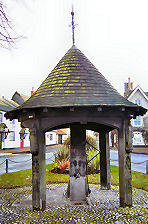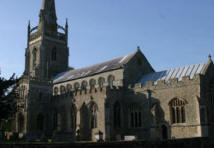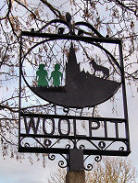
|
VILLAGE INFORMATION
What's New - Last Updated 19/06/2019
|
WHY WOOLPIT?
|
One question that is always asked by our visitors is "how
did Woolpit get its name; was it from wool, wolves, etc.?" Our
village sign should give some clue; early spellings vary -
Wlfpeta is just one example - but many think that the name means
'a pit for trapping wolves'. However, the most probable
explanation will be found in the local Museum, housed in the
Institute in the village centre. |
|
SAMPSON'S JOURNEY
|
In 1016 Ulfketel, Earl of East Anglia, granted the church
and manor of
 Wlfpeta to the Abbey of St Edmunds. The monks
received ten marks yearly from this grant, but the King
appropriated the revenues for the benefit of one of his
officials. A monk named Sampson determined to put matters right
and in 1159 travelled to Rome to obtain a charter from Pope
Alexander III. Despite being captured and robbed by his enemies
in the course of his journey, Sampson managed to preserve the
Popes precious letter directing the reversion of Woolpit and its
church to the monks, and returned to England after three years.
The monks were once again able to enjoy the income, and Sampson
was later appointed Abbot. Wlfpeta to the Abbey of St Edmunds. The monks
received ten marks yearly from this grant, but the King
appropriated the revenues for the benefit of one of his
officials. A monk named Sampson determined to put matters right
and in 1159 travelled to Rome to obtain a charter from Pope
Alexander III. Despite being captured and robbed by his enemies
in the course of his journey, Sampson managed to preserve the
Popes precious letter directing the reversion of Woolpit and its
church to the monks, and returned to England after three years.
The monks were once again able to enjoy the income, and Sampson
was later appointed Abbot. |
|
THE GREEN CHILDREN
|
 One prominent feature of the village sign is two small children.
They depict a story that goes back to the 12th century and tells
the legend of 'The Green Children of Woolpit'. This curious tale
is recorded as taking place at about the same time as Sampson's
journey to Rome. Very briefly, reapers were astonished at the
discovery of a boy and a girl in a hole in the ground. The
children were green, and spoke no recognisable language. The
boy, who was sickly, soon died, but the girl grew up in Woolpit,
and is said to have married a man from King's Lynn. This story
has been re-enacted on many occasions and has appeared on childrens' television. One prominent feature of the village sign is two small children.
They depict a story that goes back to the 12th century and tells
the legend of 'The Green Children of Woolpit'. This curious tale
is recorded as taking place at about the same time as Sampson's
journey to Rome. Very briefly, reapers were astonished at the
discovery of a boy and a girl in a hole in the ground. The
children were green, and spoke no recognisable language. The
boy, who was sickly, soon died, but the girl grew up in Woolpit,
and is said to have married a man from King's Lynn. This story
has been re-enacted on many occasions and has appeared on childrens' television.
|
|
FAIRS
|
According to records which date back to the fifteenth century,
two important fairs were held in Woolpit. The Horse Fair was
held on two closes, or fields, on September 16. The Cow Fair, on
September 19, was also held on its own field; here toys were
sold as well as cattle.
|
|
VILLAGE CENTRE
The village centre is a conservation area and the brick-faced
houses are mostly all timber faced. |
 |
|


